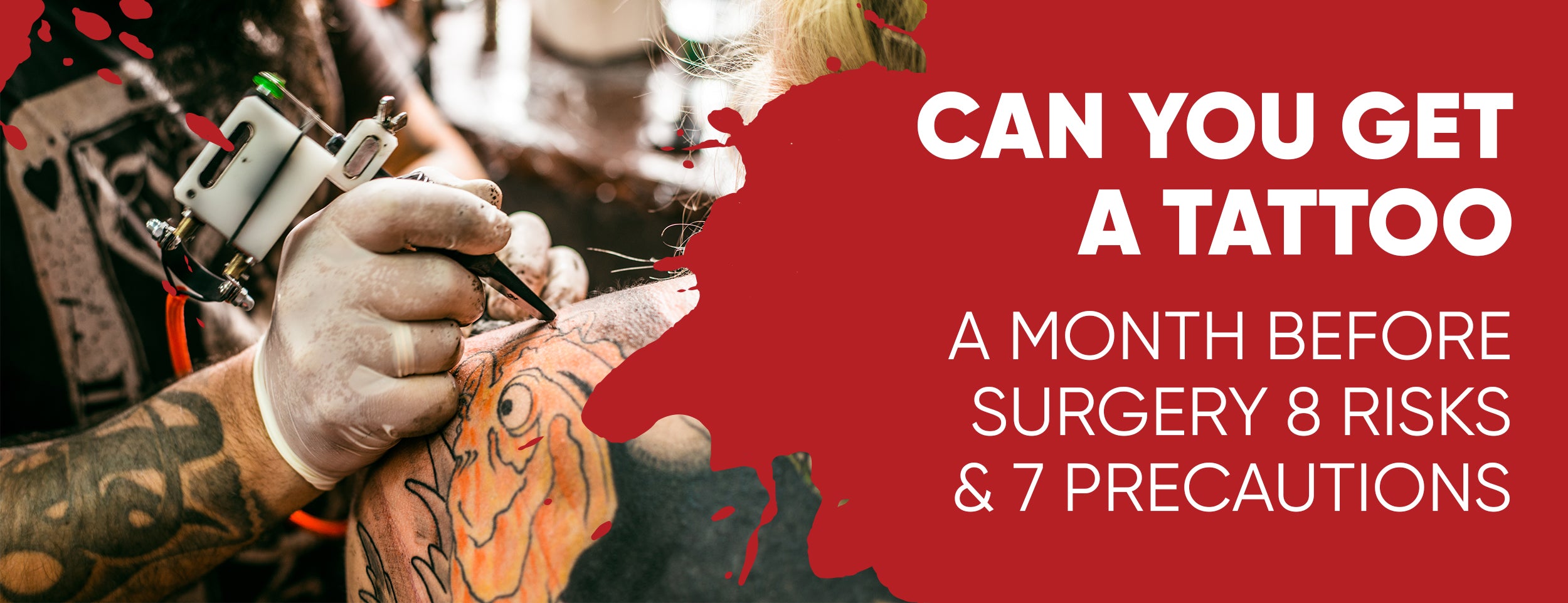Are you considering getting a tattoo before your scheduled surgery? While it may seem like a fun idea, there are important factors to consider. Healing issues, risk of infection, and potential complications during surgery are just some of the concerns. In this article, we will explore the risks and benefits of getting a tattoo before surgery, as well as precautions to take.
Table of Contents
ToggleCan You Get a Tattoo a Month Before Surgery: 8 Risks
Before going ahead with a tattoo before surgery, it is crucial to understand the potential risks involved. Here are eight risks associated with getting a tattoo a month before surgery:
Increased Risk of Infection: The process of getting a tattoo involves puncturing the skin, which can introduce bacteria and pathogens. This increases the risk of infection, which can cause serious problems during and after surgery.
Adverse Reactions to Tattoo Ink: Some individuals may experience allergic reactions to tattoo ink, leading to itching, swelling, and redness. In rare cases, medical attention may be required for severe reactions.
Interference with Medical Equipment: During surgery, medical equipment monitors vital signs and ensures everything works properly. If a tattoo is in an area being monitored, it could interfere with the accuracy of these devices and potentially cause complications during the procedure.
Delayed Healing: After getting a tattoo, the skin takes a few weeks to heal fully. If the tattoo becomes infected or takes longer to heal than expected, it could delay the surgery.
Surgical Site Infections: Tattoos can introduce bacteria into the body, increasing the risk of surgical site infections. This can lead to a longer hospital stay or a higher risk of readmission.
Difficulty in Imaging: Recent tattoos can make it more challenging for doctors to perform diagnostic tests such as X-rays, MRIs, and CT scans. Tattoos can obscure these images, making it harder for doctors to see what’s happening inside the body.
Possible Bleeding: Getting a tattoo involves a significant amount of bleeding, which can complicate surgery. Increased bleeding can make it harder for surgeons to manage blood vessels and increase the risk of complications.
Interference With Anesthesia: Certain types of tattoo ink can interfere with anesthesia, making it more difficult for the surgeon to control your pain levels during surgery. While uncommon, it is essential to be aware of this risk.
Tattoos Before Surgery: 6 Benefits
Although tattoos before surgery may not seem beneficial, there are several advantages to consider. Here are six benefits of getting a tattoo before undergoing surgery:
Reduces Stress and Anxiety
Surgery can be a stressful and overwhelming experience. Getting a new tattoo releases endorphins, lowering stress levels and promoting relaxation. By getting a tattoo before surgery, patients can feel more relaxed and cope better with the upcoming procedure.
Aids in Pain Management
While getting a tattoo can be painful, it can also help patients prepare for post-surgery pain. Research suggests that those who have tattoos have a higher pain tolerance and can better cope with discomfort. By getting a tattoo before surgery, patients can train their minds to handle pain during recovery.
Boosts Self-Confidence
Surgery can leave patients feeling vulnerable and uncertain about their appearance. A new tattoo before surgery can boost self-confidence and self-esteem. It provides a sense of control and empowerment during a challenging time.
Provides a Distraction
Getting a new tattoo can serve as a positive distraction from the upcoming surgery. It offers a fun and exciting experience for patients to focus on rather than worrying about the procedure. The process and results of getting a tattoo can divert their attention and ease their anxiety.
Fosters Positive Body Image
Many individuals report increased confidence and a better sense of self after getting tattoos. Having a positive body image can be crucial in the surgical setting. Feeling good about oneself before surgery reduces fear and anxiety, making the overall experience more manageable.
Engenders Conversation
Getting a tattoo can serve as a conversation starter with the surgical staff. It can help establish rapport and ease tension before the procedure. Knowing that the medical team is more than just strangers in scrubs can make patients feel more comfortable during surgery.
Precautions Before Tattooing a Month Before Surgery
If you are considering getting a tattoo a month before surgery, it is essential to take certain precautions. Here are seven tips to keep in mind:
- Consult with Your Doctor: Speak with your surgeon before getting a tattoo to discuss any potential risks or complications that may arise. They may advise against it to minimize the risk of infection and interference with the healing process.
- Choose a Reputable Tattoo Artist: Research and select a licensed and experienced tattoo artist who follows proper safety procedures. This reduces the risk of infection and potential complications.
- Practice Good Hygiene: Before and after getting a tattoo, ensure good hygiene. This includes washing your hands before and after touching the tattoo, keeping the area clean, and avoiding swimming or submerging the tattoo in water for at least two weeks.
- Avoid Certain Medications and Substances: Discuss any medications or supplements you are taking with your doctor before getting a tattoo. Avoid alcohol and blood thinners for at least 24 hours after the procedure, as they can interfere with healing.
- Avoid Large Tattoos: If you decide to get a tattoo, avoid getting a large one a month before surgery. Large tattoos can cause inflammation, increasing the risk of complications. Opt for a small and simple tattoo with minimal complications.
- Avoid Certain Areas of the Body: Refrain from getting a tattoo in areas where surgical incisions may be made, such as the abdomen, back, or chest. Tattoos in these areas increase the risk of infection and allergic reactions.
- Follow Proper Aftercare Instructions: After getting a tattoo, follow the aftercare instructions provided by your tattoo artist. Regularly clean the tattoo, avoid direct sunlight, and refrain from swimming or soaking the tattoo for at least two weeks.
Frequently Asked Questions
Q: Is it safe to get a tattoo before surgery?
A: Getting a tattoo before surgery carries risks such as increased infection, interference with medical equipment, and delayed healing. Consult with your surgeon to discuss any potential complications and make an informed decision.
Q: Can a tattoo affect surgical procedures?
A: Tattoos can interfere with the accuracy of medical devices used during surgery. They can also complicate imaging tests and make it difficult for doctors to see inside the body.
Q: How can getting a tattoo before surgery benefit me?
A: Getting a tattoo before surgery can help reduce stress and anxiety, aid in pain management, boost self-confidence, provide a distraction, foster a positive body image, and facilitate conversation with the medical staff.
Q: What precautions should I take before getting a tattoo a month before surgery?
A: Before getting a tattoo, consult with your doctor, choose a reputable tattoo artist, practice good hygiene, avoid certain medications and substances, opt for small tattoos in safe areas, and follow proper aftercare instructions.
Conclusion
While getting a tattoo before surgery may seem enticing, it is essential to weigh the risks and benefits. Your health should always be a top priority. Consult with your doctor, take appropriate precautions, and make an informed decision. If you do decide to proceed, choose a reputable tattoo artist and follow proper aftercare to minimize the risk of complications. Remember, it’s better to err on the side of caution when it comes to your well-being.








